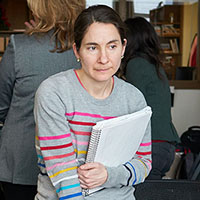
Rachel Quimby
She/Her
Ecotarium
Worcester, Massachusetts
Public Interest Technology Community Innovation Fellowship
Rachel Quimby is the Public Programs Coordinator and a Museum Educator at EcoTarium.
She has a background in education, teaching zoology, French, museum studies, and more. Quimby holds a BA in Psychology from Columbia University and earned her MA in Teaching from the George Washington University’s Museum Education Program.
Community Partner
Stefanie Covino was formerly the Conservation Planner for the City of Worcester and has an MS in Environmental Science and Policy from Clark University. Worcester is the geographic center of Massachusetts and the second-largest city in New England.
Project Description
In urban heat islands in Worcester, lack of shade and the heat trapping effect of tall buildings can push air temperatures up to 16°F hotter than other parts of the city. These heat islands can produce dangerous conditions, place an economic burden on residents, and increase fossil fuel emissions as more people turn on their air conditioning.
The project focused on learning what mitigation strategies the residents of Worcester’s most overheated neighborhoods wanted to pursue.
The project team sent out a survey to experts and community leaders and held two virtual meetings with them to help design the virtual forum. The project team held a kick-off event with brief speeches that drew connections between the city’s urban heat islands and health and encouraged participants to advocate for themselves and their communities.
A virtual forum was launched in September 2020. The forum included several potential solutions developed based on community input and allowed for participants to add their own solutions and comment on one another’s ideas. A paper survey version of solutions found in the virtual forum was distributed to residents without reliable internet access.
Forty-eight people participated in the forum. Some of the highest-ranked solutions were “plant street trees” and “add pocket parks”, while the lowest-ranked solutions were “bury power lines” and “install smart grid system”.